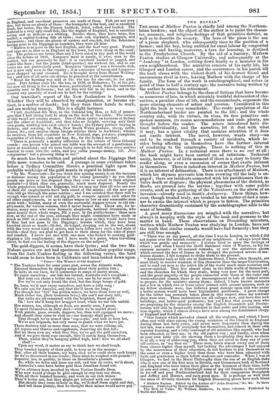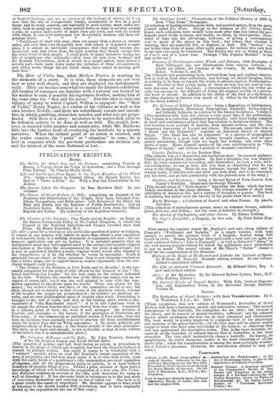TWO HOVELS.* THE scene of Mathew Paxton is chiefly laid
among the Northum- brian borders ; and the object of the author is to paint the charao- ter, manners, and religious feelings of that primitive district, as well as to describe its scenery. The hero of the piece is the son of a pious shepherd, who subsequently rises to the position of a farmer ; and the boy, being unfitted for rural labour by congenital lameness, and having, moreover, a turn for learning, is destined to the Presbyterian Church. By the aid of a bursary, Mathew Paxton studies at Glasgow University, and subsequently at the " Academy " in London, settling down finally as a minister in his own neighbourhood. The narrative consists of his early life, his Glasgow and London career, and the occurrences in his parish till the book closes with the violent death of his dearest friend and unconscious rival in love, leaving Mathew with the charge of his family. The form of the work is autobiographical, and refers in point of time to half a century ago ; the narrative being written by the author to amuse his retirement.
Mathew _Paxton belongs to the class of fictions that have become
so numerous of late, in which minutely truthful delineation of cha- racters, a peculiar class of life, and the concomitants, supersede the more stirring elements of action and passion. Considered in this light the book is very remarkable. The rustic population of the Northumberland border are painted to the life; and the whole country side, with its virtues, its vices, its free primitive out- spoken manners, its coarse accommodations and rude plenty, are brought before the reader. The actors introduced have dis- tinct individuality, and the narrative, let it deal with what it may, has a quiet vitality that sustains attention if it does not excite interest. The novel, however, wants story—an end to be reached through a variety of incidents, which be- sides being affecting in themselves have the further. interest of conducing to the catastrophe. There is nothing of this in Mathew Paxton. In a technical sense there is no end at all : the book might have been carried on ad infinitum. Technical unity, however, is of little moment if there is a story to hurry the reader along, or even a succession of scenes that excite interest in themselves. There is indeed an interest in Mathew .Paxton, but it is an interest of delineation. There is an attachment of Mathew, which his shyness prevents him from avowing till the lady is en- gaged ; there are incidents connected with his parishioners that in- volve death or disgrace ; the physical phenomena of the district, as floods, are pressed into the service ; together with some public events, such as the gathering of the Volunteers on the alarm of an invasion—already used in Scott's Antiquary. These things, how- ever, though treated truly, are treated in too matter-of-fact a man- ner to excite the interest which is proper to fiction. The primitive character dramatically sustained by the autobiographer adds to the want of breadth.
A good many discussions are mingled with the narrative, but always in keeping with the style of the book and germane to the matter in hand. These observations on Dissenting ministers, written while Mathew Paxton was studying in London, have not the truth that similar remarks would have had formerly ; but they are still true enough.
"There was no day passed, all the time I was in London, in which I did
not repine over the boorish rudeness of my neighbours. I always loved that which was gentle and mannerly : I always tried to spare the feelings of others ; and when I heard the shrill dissonant voice of Weaver, in his too common sarcastic or ill-natured remarks, or saw the ainistrous gloom which covered the face of James as he dropped the poisoned arrows of ma- licious slander, I felt tempted to strike them to the ground. "Academies such as this one in Redcross Street, I have often thought, are more likely to receive students of this character than the larger Universities, and to send out men to the active life of the world much more sectarian and narrow-minded. They live almost alone in the little world of themselves ; and the churches for which they study, being very poor for the most part, and the great majority of the people connected with them of the ruder and worst-educated classes, there is no encouragement to lads of refined minds to prepare for the ministry among them; indeed, I have known instances not a few in which two or three years' contact with grosser natures, such as my fellow students were, has inflicted great damage upon lads who under a better system would have been highminded gentlemen. A great change for the better has certainly taken place in this respect since my academy days were over. These institutions are all colleges now, and have fine new buildings, and better-paid professors ; but yet I fear that young men who are preparing for the ministry among the English Dissenters and Presby- terians will still be found sadly deficient in that polite and lofty bearing, and true dignity, which I almost always have seen among the Established clergy of England and Scotland.
"One feature which pervaded almost all the students, and which I have often met with since among the young ministers of the Church in England during these last forty years, and never more frequently than during the last ten, was a scorn of everybody but themselves, and conceit in their own superior learning, and a lofty contempt of old ministers like myself, who had been educated, as they say, in the old jogtrot way ; and finally, even when at your own table you are showing them a hospitality they have no claim to at all, a way of addressing you, when they are about to deny any of your old notions, as my dear sir.' These men, taken almost every one of them from classes higher than myself, but lacking the advantages I had enjoyed by the narrowness of their education, do not hesitate to put themselves on the same or even a higher level than those who have been educated with lords and gentlemen as their fellow students and comrades. When I was at Glasgow, we had in the Moral Philosophy class the son of an English duke who is now one of the first men in Britain, and Commoners both of Scotland and England who have taken their place as the foremost of their time, both in arts and arms; and at Edinburgh some of my old friends in the ministry in far-off and poor Northumberland had for their companions Brougham and Jeffrey and Horner, and such great men. It is perhaps as well that the mass of divinity students for English Dissenting places have such blunt
• Mathew Paxton. Edited by the Author of" John Drayton," Etc. Sic. In three volumes. Published by Hurst and Blackett.
The Heir of Valli& By William Mathews. In three volumes. Published by Smith and Elder. or blunted feelings, and are so careless of the feelings of others; for I am sure that the son of a respectable family, accustomed to live in a good house and to every comfort, and especially to good society, must suffer ter- ribly, both in mind and body, when settled down on sixty or seventy pounds a year, in a place half a score of miles from any town, and with no society with whom he can hold intercourse but ill-educated farmers and their de- pendant hinds.
"Neighbours of their own class, often not nearer than a dozen or twenty miles, and even then very frequently men with whom it is painful to asso- ciate, it is almost an inevitable consequence that they must become dis- heartened, and sink down from the high position they should occupy into the lower level of their people. I could point to many instances during my life of neighbours who originally—they were all men from Scotland and the Scottish Universities, such as would in a proper sphere have played a notable part—have sunk down under the influence of these circumstances, and, where worse things did not befall them, have ended in making gold their God."
The Heir of Vallis has, what Mathew Paxton is wanting in, the elements of a story. It is trite, these elements are not very new or very well chosen, and they are displayed too melodramati- cally. They are besides somewhat too many for distinct exhibition. All readers of romances are familiar with a natural son trained by his mother to ruin if possible his legitimate brother, making him at the same time his "fool and his purse." But this idea is only one villany of many in which Captain Wilton is engaged: the "Heir of Vallis," Henry Napier, is a victim of his villanies as well as his own brother Neville; and there are subordinate rascals and rascali- lies, in which gambling, abduction, murder, and what not, are perpe- trated. Still there is a story ; mysteries to be unravelled, plots to be defeated, actions to be done as well as told. The reader, how- ever, is wearied with number and complexity, while Mr. Mathews falls into the further fault of overlaying his incidents by a minute narrative. When the critical point of an action is reached, and the reader expects the "point" or " situation" to come, he is held in suspense while the previous particulars are written out, and the interest of the scene flattened or lost.



























 Previous page
Previous page